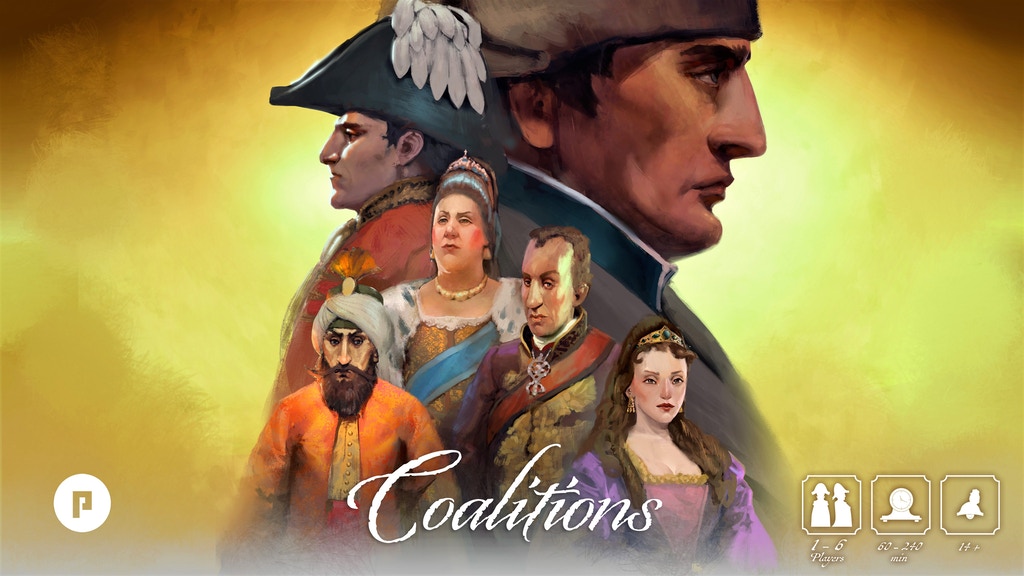Development and Realpolitik
almost 2 years ago
– Mon, Jan 23, 2023 at 05:25:53 AM
Hello Everyone!
We’re happy to say we’re meeting our latest production timetable (as set out in our last update) – the development process of the Realpolitik standalone expansion is finished, the illustrations and art are all but done, and the rulebooks are almost ready to go into DTP. Good news all around!
How is Realpolitik different from other Coalitions game?
Realpolitik features many of the same core mechanics as Coalitions, but has some key differences. Most notably, the Wheel of War is replaced by a card-based action selection mechanic. Players play and resolve one of five action cards simultaneously. This introduces more uncertainty into the actions opponents will take, and more decision-making about which action to take and when.
Diplomacy also works a bit differently, being driven by a track rather than always occurring at the same step. There are no more multi-power coalitions or neutrality. Two powers can form an alliance, but otherwise will be at war with the other powers. And, since this game is set at the start of the Industrial Revolution, there are now trains! These allow Generals and Units a pre-move prior to their main movement action, meaning movement across the map is a lot quicker.
Let’s get into more details, shall we?
Action cards, turns & rounds
A hand of Action cards is used to determine which action a Power will take this turn. Each Power has the same 5 Action cards, each allowing it to take a different action: Taxation, Mobilisation, Gain Influence, Movement, and Diplomacy.
At the start of each turn, players play their chosen Action card simultaneously. Taxation, Mobilisation, and Gain Influence (i.e. victory points) are resolved simultaneously. Movement occurs after the other actions.
Once a card has been played, it cannot be played again until the Diplomacy action is played. This allows you to return all played cards to your hand, including the Diplomacy card.
Consequently, there are no shared Rounds in a game of Realpolitik. You effectively play your own round, which ends when you take the Diplomacy action, and begins when you have a full hand of Action cards.
When the Diplomacy marker has reached the leftmost space on the Diplomacy track, players jointly resolve the Diplomacy Phase. This occurs before Movement but after all the other actions have been resolved.
Diplomatic entreaties
Each player has 2x War and 1x Alliance Diplomatic Status markers. Following any negotiations, Powers simultaneously hand a Diplomatic Status marker to each other Power (regardless of their current Diplomatic Status to each other).
Each Power then reveals the 3 markers they have received. If any Power receives an Alliance marker from a Power that they gave their Alliance marker to, those Powers are now in Alliance. In any other outcome, the Powers are At War.
Don’t forget – as in other Coalitions games, no commitment made during the negotiation step is binding. Also, it’s possible that all Powers will be At War with each other, creating quite a volatile situation on the board!
Trains
Trains can be added to the board by any Power, facilitating swift movement between Territories. Trains allow for a pre-move prior to a first round of movement. They are placed between the borders of Territories controlled by the same Power, or between Ally Powers. Some are placed at set-up, and more can be added through Mobilisation.
Once a Train is placed it remains in place for the rest of the game, regardless of if control of one or both of the adjacent Territories changes.
Prior to taking a Movement action, a power may move any number of Generals through an unlimited number of Territories they control that are connected by Trains. They may also move Units in this way between Generals that do not take a Train pre-move. You cannot use a Train to pre-move Generals or Units into a Territory you do not control, unless it is a Territory controlled by an Ally, and that Ally agrees.





